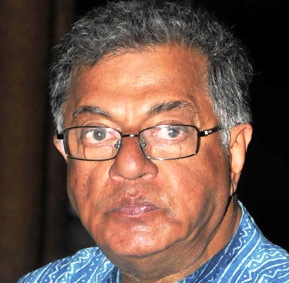
Mumbai, November 3: Noted playwright Girish Karnad delivered a stinging attack on V S Naipaul for his views on Muslims in India, calling the Nobel Laureate "stone deaf" and an "unreliable" writer of non-fiction as far as this country is concerned.
Karnad, who criticised Naipaul yesterday during a session on theatre at the "Literature Live!" literature festival here, today stood by his remarks and ruled out any apology to the India-born writer.
"I completely stand by my statement. I haven't made any mistake, rather I came prepared for it," Karnad said, as his remarks shocked the organisers of the Festival.
"Naipaul has no idea of how Muslims contributed to Indian history," Karnad said in his address during which he also attacked Naipaul for his reported visit to BJP office after Babri mosque demolition in December 1992.
Dwelling on Naipaul's anti-Islam stance in his writing, Karnad said, "Given that music defines our daily existence... you find it in the streets, in the restaurants and so on... you would expect an exploration of India to comment on that.
Now Mr Naipaul has written three books on India. If you read them, you find that not even one of them contains any reference to music. He has gone through the whole of India without responding to Indian music. I think that only means that he is tone deaf."
Naipaul, who was given the Lifetime Achievement Award at the festival, was not present when Karnad made the remarks before a small audience which included actor Naseeruddin Shah.
Karnad also questioned the decision of the Festival organisers to honour Naipaul with the award.
Calling Naipaul an unreliable writer of non-fiction as far as India is concerned, he said, "He really doesn’t pay much attention to the details of the texts he studies."
Reacting to Karnad's remarks, festival director Anil Dharker said, "We were all taken aback by Girish Karnad's attack on V S Naipaul. After all, we had invited him (Karnad) to speak about his journey in theatre...
"I am all for free speech but free speech presupposes a dialogue, not a diatribe. Karnad's two objections to Naipaul getting the award are demonstrably false," Dharker said in a statement.
Earlier:
Mumbai, November 3: There’s nothing like a literary feud to make a literature festival buzz. It was supposed to be an hour-long “masterclass” by playwright Girish Karnad and ended up being 45 minutes of fireworks at Tata Literature Live! Instead of speaking about his plays, Karnad attacked Nobel laureate VS Naipaul for being anti-Muslim, tone deaf and an unreliable writer of non-fiction as far as India is concerned.
Karnad asserted that Naipaul “has no idea of how Muslims contributed to Indian history.” He questioned the authenticity of Naipaul’s non-fiction writing and said, “He really doesn’t pay much attention to the details of the texts he studies.”
Much of what Karnad said has been said before by Naipaul’s critics, like William Dalrymple who wrote a long piece outlining the flaws in Naipaul’s arguments about Indian history in 2004. Like Dalrymple, Karnad spoke at length about Naipaul’s problematic retelling of the fall of Vijaynagar (in 1565) in A Wounded Civilization.
Naipaul was awarded the Landmark Literature Live! Lifetime Achievement Award earlier this week. Karnad questioned the festival’s decision to do so and asked how the festival justified valorising him despite Naipaul’s leaning towards the right-wing in the matter of the demolition of Babri Masjid in 1992. “My question is to organisers who keep giving him lifetime awards as though what he has to say about a large section of the Indian population, about a whole rich period of Indian history which was our glory, doesn’t matter.”
When festival director Anil Dharker told Karnad it wasn’t polite of him to use the platform the festival had provided him like this, Karnad replied, “I don’t have to be polite. I’m following in the footsteps of Naipaul.”







Comments
Add new comment